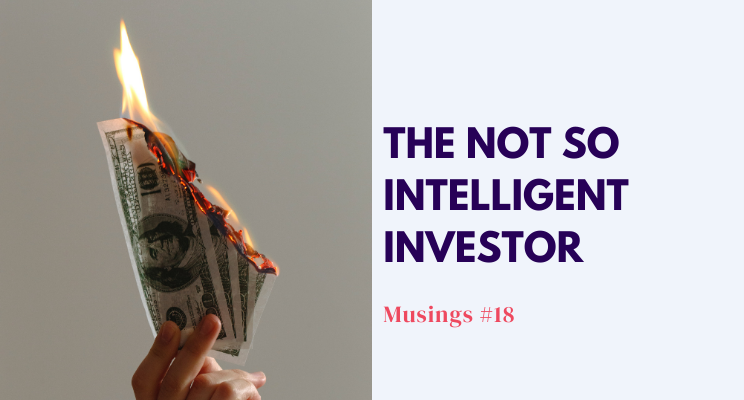“Hard work, honesty, if you keep at it, will get you almost anything.”
— Charlie Munger
Some of you know this story already. Warren Buffett initially bought Berkshire Hathaway (BRK) shares at $7.5 in 1962 when it was an ailing textile mill. Around this time, he followed an investment principle called value investing, where you buy distressed stocks at a low price and sell when the price increases. Seabury Stanton ran BRK at that time, and he agreed to purchase the shares from Warren (who had accumulated a substantial amount of shares) for $11.5. But Stanton reneged on this deal, which made Warren angry. He decided to teach Stanton a lesson and bought more shares and took majority control of the dying company (for $14M) – probably one of the worst investment calls that Warren has made as an investor.
But over the past six decades, Warren and his long-time partner Charlie Munger have corrected this mistake by becoming collectors of some excellent companies across various sectors inside BRK. And the stock is now valued at over $316,000, with a market capitalization of over $500 billion. Over the past few weeks, I have spent a lot of time reading about and thinking through the critical lessons from Warren Buffett and Charlie Munger from their experiences for over half a century. And here are my pick of the top ten principles to learn from them.
(Most quotes below are from “Snowball: Warren Buffett and the Business of Life” unless explicitly mentioned otherwise.)
1) Honesty and Integrity
Both Warren and Charlie are considered epitomes of both these virtues, and that is one of the keys to playing any game at the highest level for an extended period of time. When a $700M investment in bond-trading powerhouse Salomon Brothers blew up due to a scandal involving an unethical trader whose flaws were covered up by the management, the company was very close to filing for bankruptcy. Warren’s flawless reputation helped him jump in and run the firm for nine months to help them out of the crisis. His message to employees:
“Lose money for the firm, and I will be understanding. Lose a shred of reputation for the firm, and I will be ruthless.”
And he also suggested a test that is worth each of us to internalize – “Front-page test.”
“I want employees to ask themselves whether they are willing to have any contemplated act appear the next day on the front page of their local paper, to be read by their spouses, children, and friends, with the reporting done by an informed and critical reporter.”
2) Expecting the best out of people
“He was a likable boss who never lost his temper, never changed his mind capriciously, never said a rude word to anyone, never berated or criticized his employees, didn’t second-guess people on their work, and let them do their jobs without interference. He also operated on the assumption that if somebody was smart, they could do anything.”
Buffett, along with Munger, became experts at identifying high-quality companies run by great management. They acquired companies but let the management continue with minimal interference. Again an essential skill, whether we are managing a few people or working with the CEO of a large corporation, the people aspect becomes critical.
Dale Carnegie said to give people a fine reputation to live up to, and Buffett had learned that lesson well. He knew how to Carnegize heroic accomplishments out of his people.
3) Frugality
Buffett’s frugality is something that appealed to me personally. In this day and age, when most people are spending borrowed money, Warren used to say that a dollar today can be worth ten in a few years and extremely careful in conserving capital for allocating them towards investment opportunities. Be it our own personal finance or managing capital allocation for our company, a frugality mindset, and seeking efficiency in capital allocation will always come in handy.
4) Hustle
Again a quality I admire and notice in most successful people. Their ability to work extremely hard over long periods and push the rock uphill to achieve whatever they want. In 1956, twenty-six-year-old Warren moved to Omaha to start his first investment partnership from scratch. He could only raise $105,000 from mostly friends and family. Over the next five years, he hustled and put together eleven such partnerships to build his investment corpus to $7.2M (the equivalent of $60M today). As a side note, he did not have any employees during this period and did all the work himself (including book-keeping and filing taxes) – he hired his first secretary only at this point.
5) Maniacal Focus
Another characteristic that we can universally associate with success. Some of these core characteristics can be observed even at a very early age. As a sixteen-year-old, Warren loved data and became interested in Horse Handicapping (in horse racing) and started studying it. Here is a chapter from that story where he got his dad (a Congressman at that time) to get him hundreds of books on horse handicapping from the library of Congress:
“Then what I would do is read all these books. I went away to a place in Chicago on North Clark Street where you could get old racing forms, months of them, for very little. They were old, so who wanted them? I would go through them, using my handicapping techniques to handicap one day and see the next day how it worked out. I ran tests of my handicapping ability day after day, all these different systems I had in my mind.”
6) Extremely Disciplined and Patient
I am not an early morning person and cannot fathom myself doing this one! Warren used to get up at 4 am as a 12-year-old to deliver 500 newspapers to make a living. It is another example of being disciplined to achieve one’s goals from an early age. A key characteristic that could greatly complement discipline is patience. Here is Warren talking about the importance of patience in investing – probably the same applies to every high-value decision in our life – they are few and generally far apart.
“You’d get very rich,” he said, “if you thought of yourself as having a card with only twenty punches in a lifetime, and every financial decision used up one punch. You’d resist the temptation to dabble. You’d make more good decisions and you’d make more big decisions.”
7) Simplicity
This one is more attributable to Charlie Munger but equally applied by both Munger and Buffett. For every investment opportunity, they had a simple framework to decide.
“We have three baskets for investing: yes, no and too tough to understand” – Poor Charlies Almanack
As an investor, if we apply a similar simple framework to our own investment philosophies and are disciplined about this, it is easy to eliminate more than 90% of investment opportunities presented us and to free up our time to focus on the remaining 10%. One of my VC mentors used to say finding good investments is all about “Spending 90% of your time in the 10% of the opportunities you come across.” The tough part is figuring out which is the right 10%.
8) Wide variety of Mental Models and Growth Mindset
Both Charlie and Warren have a hungry mind and spend more than five hours every day reading and thinking. Not very easy when you are Chairman and Vice-Chairman of a very large corporation. Through this, they have a wide variety of mental models to draw from, and this is a topic by itself to study closely. We already saw some of these models in action when we discussed Decision Making. Using these mental models, they can quickly decipher the 10% of investment opportunities to dive deeper and approach it in a multi-disciplinary way to figure out the best investment opportunities.
9) Decisiveness
And once they decide on the few cards to punch (the actual investments), they are quick to bounce on them decisively. For example, Warren wanted to buy an insurance company and had his eye on National Indemnity for some time. When the opportunity came in 1967, he struck a deal with Its owner Jack Ringwalt in just 15 minutes (knowing fully well that if he was not quick, Jack might change his mind). He drew up a 1-page agreement the same day and closed the deal promptly. It was the re-birth of dying Berkshire Hathaway since the Insurance business provided the float – the capital required to invest and acquire the rest of the companies that Berkshire Hathaway owns.
10) Grit
We have delved into this topic before. Grit is an underlying theme across Warren’s life right from childhood all through till today. From the story of starting as a paper delivery boy, or selling golf balls, to starting 11 partnerships, to struggling with a lousy asset in Berkshire Hathaway, to buying an insurance company, to turning around hopeless situations like Salomon Brothers – Buffett (90) and Munger (95) have hung in there through thick and thin. Just their annual meetings, which sees 40,000 people attending and a mini-celebration nowadays, was for the first decade attended by less than a handful of people. But, they have been the same through these times – they still answer every question from every attendee today, just as they used to do when it was a handful attending.
We will end this section with a classic quote that neatly summarizes the top ten takeaways on what made Warren and Charlie so successful as investors.
“So the really big money tends to be made by investors who are right on qualitative decisions” – Buffett
To Read and Ponder
Owners Manual – In 1983, Warren and Charlie first published an owner’s manual to help shareholders understand the Berkshire Hathaway business and its principles. They updated it in 1999 and still stick to these thirteen core principles and an added one. These principles are worth studying closely by every founder to determine which ones to emulate as you build your own enduring company.
“Charlie and I cannot promise you results. But we can guarantee that your financial fortunes will move in lockstep with ours for whatever period of time you elect to be our partner. We have no interest in large salaries or options or other means of gaining an “edge” over you. We want to make money only when our partners do and in exactly the same proportion. Moreover, when I do something dumb, I want you to be able to derive some solace from the fact that my financial suffering is proportional to yours.”
Work Corner
Warren and Charlie talk about “Economic Moats” that help with Value Creation that they look for while acquiring or investing in companies. This week, I enjoyed chatting with my colleague Ajay on Value Creation in startups and key drivers that founders can apply as they scale their startups.
https://www.seedtoscale.com/podcast/ajay-sethi?
Today was longer than usual, but these are timeless lessons from two of the sharpest business thinkers and investors on the planet. I hope we can learn and adapt some of these principles to make our businesses and lives better. Have a great weekend!
(If you are enjoying Musings and find it helpful, please subscribe, and please share with friends who might find it useful.)Message



